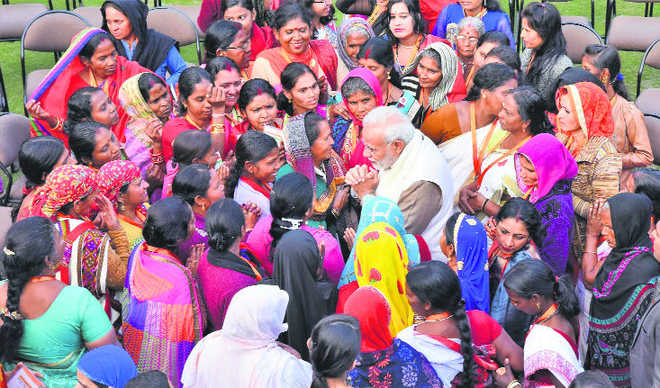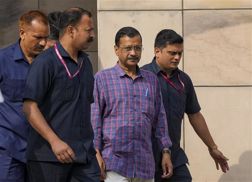
The road ahead: To protect the rights of women, the BJP has reiterated its stand to draft a Uniform Civil Code. With a clear mandate, the party is also promising to provide for women’s reservation in Parliament and state legislatures
KV Prasad in New Delhi
The thumping majority handed over to Narendra Modi by voters to lead the country for another five years marks a new beginning in national politics. For the first time in the 60-odd years since India became a Republic, a government led by a non-Congress leader with a full tenure was voted back to power for the second consecutive term.
The Prime Minister characterised it as a mandate to construct a New India that is inclusive and aspirational in which age-old constructs of caste and community would be dismantled, leaving only two classes of citizens — the poor and those who want to fight the scourge of poverty.
Having offered the country a “majboot sarkar”, the BJP, under Prime Minister Narendra Modi, struck a chord with people endorsing nationalism in which a strong country comes first, and everything else later. There were few questions on the unfulfilled promises or incomplete tasks of the government as the party assiduously kept reminding, especially the underprivileged, of how each section benefited through the delivery of various welfare schemes.
“My first vow is that I will not do anything out of ill-will or bad intention. I could make mistakes but never do anything out of malice. My second vow is that I shall never do anything for myself, and my third vow is that every minute of my life will be devoted to the country. Whenever you want to evaluate me, you must do so on these parameters”, PM Modi said at the party headquarters in what is equivalent to the acceptance speech in the US by the President-elect.
Even before the electoral process got over, reports suggested that the Prime Minister had put his official team to work on a draft action plan for the first 100 days in office. The immediate task for the Modi government will be to find a new team that will take forward the plan and translate it on the ground.
Having offered what it wants to do to take the country forward, the BJP’s Sankalp Patra can be a good reference point. While offering broadbrush strokes of what the government wants to accomplish in the second term, it also has a sub-set of 75 specific objectives by 2022 when India turns 75. This will be the template to measure progress when India turns 75.
Over the past five years, there were concerns expressed in the country over the drift of the society. There were sporadic reports about some sections of peopletook law in their hands, lynched many and handed down punishment in their way. While those violating law of the land should be taken to task, the question is who should enforce it, authorities entrusted to maintain it or mobs? Strong action taken or promised by state governments, irrespective of the party to which it belongs, should act as a deterrent.
It is reassuring that Prime Minister Modi’s first tweet after gaining ground on the day of results said, “Sabka Saath, Sabka Vikas plus Sabka Vishwas”. The party manifesto promises that inclusive development is its commitment to empower and develop with dignity all minorities, including Muslims, Christians, Sikhs, Buddhists, Jains, Parsis and others. In the speech at BJP head office, the PM remarked that during the campaign, there was no reference to either secularism or corruption being an issue.
The BJP Sankalp Patra underscores that the party remains committed to combat the menace of terrorism and having demonstrated its will through surgical and air strikes, it will pursue the policy of zero tolerance to terrorism. Of course, one is yet to hear about the progress made on the Naga Accord signed in the early days of the Modi government.
Among the other challenges before the new government will be the ability to deal with law and order issues, which essentially is a state subject. However, the party promised to engage with states in modernisation and bring everyone at par to combat emerging threats from cyber space.
Some contentious issues
There are a few hot-button issues. The party had promised to abolish Article 370 and 35 A. This was the issue on which the BJP had campaigned in the state. It is likely to find greater resonance when schedule for the state assembly is being worked out.
Similarly in the Northeast, the issue of Citizenship Amendment Bill that caused unrest can now be taken forward since the region, in general, and Assam, in particular, has reposed faith in the BJP.
The party’s long-standing promises also found a mention in the manifesto. These include resolution of the Ram Temple construction at Ayodhya and adopting a Uniform Civil Code. In the past, these issues, along with Article 370, were kept on the backburner, especially during the NDA regime of Atal Bihari Vajpayee.
“The BJP believes there cannot be gender equality till such time India adopts the Uniform Civil Code, which protects the rights of all women, and the BJP reiterates its stand to draft a Uniform Civil Code, drawing upon the best traditions and harmonising these with the modern times”.
In this light, the new government would work to take forward the legislation on triple talaq as well.
Other subjects that are close to the current BJP leadership is the issue of simultaneous polls which the Prime Minister has been talking about and urging people and parties to think about how it can be done. According to party leaders, the issue would be taken up after the party gets numerical strength in Parliament to push this Constitutional amendment.
The party is also promising to provide for women’s reservation in Parliament and state legislatures, With a clear mandate and most political parties on board, this progressive piece of law-making should be easy.
There are and will be many challenges before the government with the task of sustaining economic trajectory in the wake of anticipated headwinds while confronting changes occurring in the geo-political and strategic sphere focused separately on this page.


























